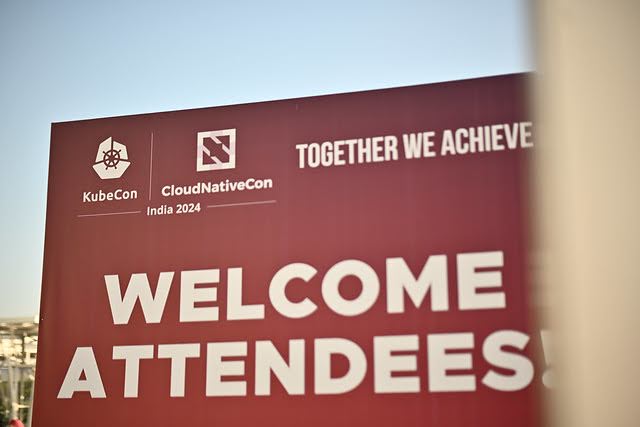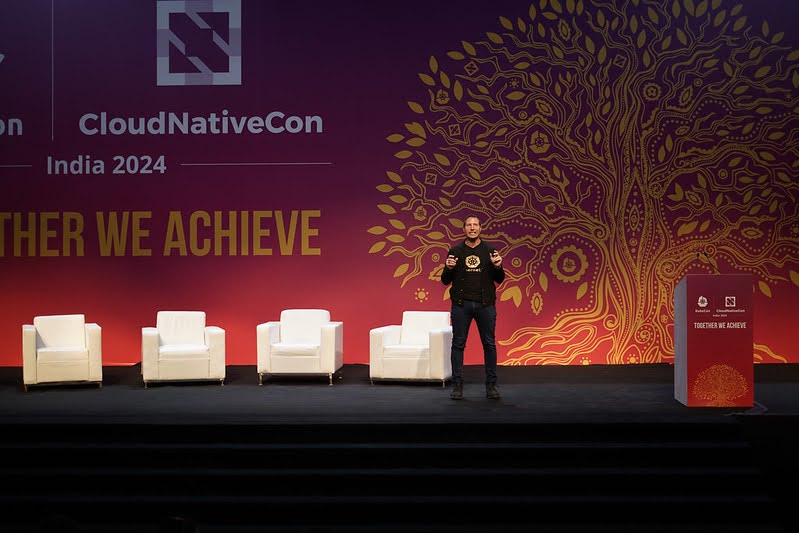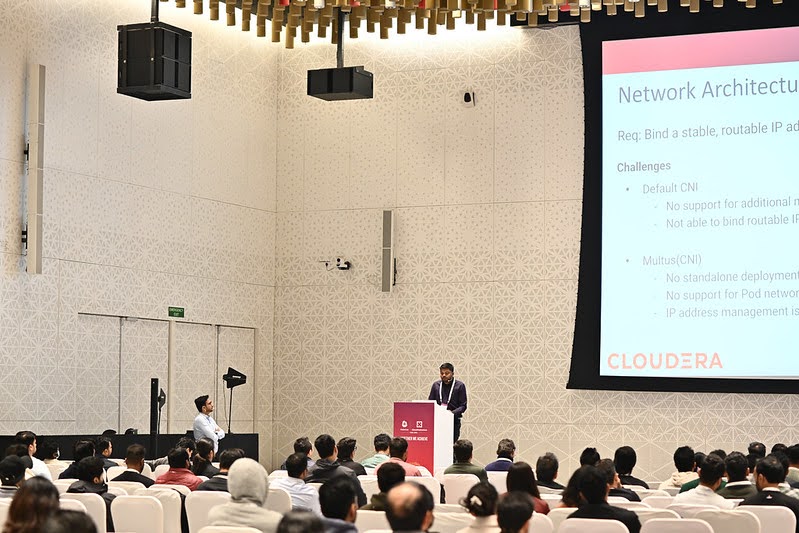- Article
KubeCon India 2024 - A Celebration of Innovation

The energy at KubeCon + CloudNativeCon India 2024 in Yashobhumi, Delhi was noticeable. This first-ever KubeCon hosted in India marked a significant milestone in the adoption of cloud-native technologies across the region. With over 4,000 professionals gathering on December 11-12, 2024, the event showcased the latest advancements and celebrated the 10th anniversary of Kubernetes, a technology that has transformed modern application development.
This blog explores the event’s highlights, emphasizing platform engineering trends, keynotes, and actionable insights from breakout sessions and workshops. Whether you’re a seasoned Kubernetes expert or just beginning your journey, these takeaways offer valuable guidance for navigating the cloud-native ecosystem.
Kubecon India Highlights

- Welcome and Opening Remarks: Chris Aniszczyk, CTO of CNCF, emphasized the growing global significance of cloud-native technologies and announced the formation of the Linux Foundation India chapter, a move aimed at strengthening the local ecosystem.
- Flipkart’s Service Mesh Journey: I.V. Prasad Reddy and Purushotham Malipedda shared insights into adopting Istio at scale, highlighting challenges, successes, and the transformative impact of service meshes on reliability and scalability.
- End User Evolution: Rajas Kakodkar (Broadcom), Aparna Subramanian (Shopify), and others shared global cloud-native adoption stories, shedding light on how organizations are overcoming operational challenges to innovate faster.
- Security and Compliance: Solutions like Falco and Kyverno are making zero-trust architectures and compliance easier to implement.
- Edge Computing: Lightweight Kubernetes distributions like K3s are driving real-time decision-making in retail, healthcare, and telecom.
- GenAI on Kubernetes: Arun Gupta and Kaushal Desai provided actionable recipes for deploying generative AI solutions in cloud-native environments.
- Building IDPs: Sessions provided insights and guidance for creating developer-friendly platforms that integrate seamlessly with Kubernetes clusters.
Platform Engineering Focus

Platform engineering emerged as a central theme, with a spotlight on Internal Developer Platforms (IDPs) and tools like Backstage and Crossplane that abstract Kubernetes complexities. Some of the interesting talks centered around platform engineering were:
- Hybrid Cloud Infrastructure: How Kubernetes Bridges Multi-Cloud and Legacy Systems and transforming HCI landscape by unifying public, private, and on-premise systems under a single control plane. Tools like KubeVirt and Crossplane streamline multi-cloud and VM management, while solutions like NMState and Multus CNI tackle networking challenges. This approach simplifies operations, enhances flexibility, and modernizes legacy systems for efficient hybrid environments.
Youtube | Slides - App of Apps Pattern: Transforming PepsiCo’s Delivery Processes: PepsiCo’s adoption of the App of Apps pattern has revolutionized their deployment workflow by centralizing application code, configurations, and IaC into a unified platform. This self-service approach has reduced ServiceNow tickets by 50%, deployment time by 25%, and improved MTTR. Key enablers include GitOps with ArgoCD, Helm charts, and OPA policies, streamlining operations and accelerating developer onboarding. Containerization further enhances consistency, scalability, and efficiency, marking a significant shift in PepsiCo’s software delivery.
Youtube | Slides - Scaling GitOps: Shivani Mehrotra’s experience scaling ArgoCD for 30,000+ applications offered insights into achieving operational efficiency with declarative infrastructure practices.
Youtube | Slides - Observability in Platforms: Intuit’s approach to robust monitoring and logging underscored the importance of proactive issue resolution for platform teams.
Youtube | Slides - Building High-Throughput Platforms: Building high-throughput platforms on Kubernetes presents challenges like asynchronous operations, rate limiting, multi-tenancy, and configuration management. Intuit’s experience highlights the need for end-to-end asynchronous flows, precise rate limiting for high TPS, careful multi-tenant architecture design, and scalable configuration mechanisms. Rigorous testing and anticipating side effects are crucial for success.
Youtube | Slides
My Experience
Attending KubeCon has been an eye-opening experience, providing me with a deep understanding of the latest trends and challenges in the cloud-native ecosystem. I gained valuable insights into advancements in platform engineering, including the transformative role of Internal Developer Platforms (IDPs), GitOps, and tools like Backstage and Crossplane.
Sessions like “ Building Resilient Kubernetes Clusters” and “ Implementing GitOps with Flux” gave me actionable insights into disaster recovery, node management, and multi-cloud deployments.
The “ Service Mesh Deep Dive” and “ Securing Kubernetes Clusters” provided practical strategies tailored for platform engineers.
I also got the opportunity to attend an insightful talk by Atulpriya Sharma on the Platforms Working Group (part of TAG App Delivery), which highlighted the growing momentum around platform engineering globally.
The session delved into their mission to support platform adoption, showcasing key initiatives like their comprehensive whitepaper and maturity model—tools designed to guide teams at every stage of their platform journey.
Personally, attending KubeCon was a transformative experience. The Platforms Working Group’s talk was particularly inspiring, showcasing the power of community-driven initiatives and the importance of collaboration in shaping the future of platform engineering.
Join the Platform Engineering Movement!
Whether you’re new to Platform Engineering or a seasoned expert, we invite you to join the vibrant and collaborative Platform Working Group. This is a space where professionals share knowledge, solve challenges, and shape the future of platform engineering together.
Join:
Connect with us on CNCF Slack in the #WG-Platforms channel: Slack Link (QR Code). Introduce yourself, share your interests, and someone from the team will guide you to get started.Contribute:
Attend bi-weekly meetings to collaborate on projects and initiatives. You can also contribute blog posts, participate in local meetups, or help organize community events.Connect:
Join us at KubeCon Europe in London from April 1- 4 as well as the Platform Engineering Colocated event. Also, Kubecon India 2025 is already announced for August 6 & 7 2025, don’t miss to register and let’s connect there.
As the cloud-native ecosystem continues to grow, events like KubeCon remind us of the importance of learning, sharing, and contributing to the community. Even if we’re just starting our cloud-native journey or are seasoned experts, there’s always something new to explore and ways to get involved.
Let’s continue to build, innovate, and shape the future of cloud-native technologies together. See you at KubeCon Europe 2025 and Kubecon India 2025!
Feedback
Was this page helpful?
Glad to hear it! Please tell us how we can improve.
Sorry to hear that. Please tell us how we can improve.